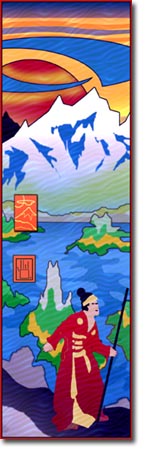On The Way: The Daily Zen Journal
Transmission of Mind inThe Chun Chou Record pt 6
Huang-po (d. 850)
Q: Mind is the Buddha; but it is not clear as to what sort of mind is meant by this ‘Mind which is the Buddha.’
A: How many minds have you got?
Q: But is the Buddha the ordinary mind or the Enlightened mind?
A: Where on earth do you keep your ‘ordinary mind’ and your ‘Enlightened mind’?
Q: In the teaching of the Three Vehicles it is stated that there are both. Why does your Reverence deny it?
A: In the teaching of the Three Vehicles it is clearly explained that the ordinary and Enlightened minds are illusions. You don’t understand. All this clinging to the idea of things existing is to mistake vacuity for the truth. How can such conceptions not be illusory?
Being illusory, they hide Mind from you. If you would only rid yourselves of the concept of ordinary and Enlightened, you would find that there is no other Buddha than the Buddha in your own Mind. When Bodhidharma came from the West, he just pointed out that the substance of which all people are composed is the Buddha.
You people go on misunderstanding; you hold to concepts such as ‘ordinary’ and ‘Enlightened’ directing your thoughts outwards where they gallop like horses! All this amounts to beclouding your own minds! So I tell you Mind is the Buddha. As soon as thought or sensation arises, you fall into dualism.
Beginningless time and the present moment are the same. There is no this and no that. To understand this truth is called complete and unexcelled Enlightenment. 
Q: Just now you said that the beginningless past and the present are the same. What do you mean by that?
A: It is just because of your seeking that you make a difference between them. If you were to stop seeking, how could there be any difference between them?
Q: If they are not different, why did you employ separate terms for them?
A: If you hadn’t mentioned ordinary and Enlightened, who would have bothered to say such things? Just as those categories have no real existence, so Mind is not really ‘mind.’ And, as both Mind and those categories are really illusions, wherever can you hope to find anything?
Q: Illusion can hide from us our own mind, but up to now you have not taught us how to get rid of illusion.
A: The arising and elimination of illusion are both illusory. Illusion is not something rooted in Reality; it exists because of your dualistic thinking.
If you will only cease to indulge in opposed concepts such as ordinary and Enlightened, illusion will cease of itself. And then if you still want to destroy it wherever it may be, you will find that there is not a hairsbreadth left of anything on which to lay hold. This is the meaning of: ‘I will let go with both hands, for then I shall certainly discover the Buddha in my Mind.’
Q: If there nothing on which to lay hold, how is the Dharma to be transmitted?
A: It is a transmission of Mind with Mind.
Q: If Mind is used for transmission, why do you say that Mind does not exist?
A: Obtaining no Dharma whatever is called Mind transmission. The understanding of this Mind implies no Mind and no Dharma.
Q: If there is no Mind and no Dharma, what is meant by transmission?
A: You hear people speak of Mind transmission and then you talk of something to be received. So Bodhidharma said:
The nature of the Mind when understood,
No human speech can compass or disclose.
Enlightenment is naught to be attained,
And one who attains it does not say s/he knows.
Huang-po (d. 850) Recorded by P’ei Hsiu (858)
Excerpted from The Zen Teaching of Huang-po – On the Transmission of Mind Translated by John Blofeld




At times in reading questions voiced by practitioners in the past and present, we can hear ourselves asking other teachers similar sounding questions.
It is always easier to read others’ stories and see the persistence/ego trying to “understand” things all the while getting even more confused. In the above reading it almost feels like a dog chasing its tail; there is a sense of futility in trying to use words to describe what can only be wordlessly experienced.
What about “observing one’s mind in tranquility?” The following poem takes us out of discursive mind into serene reflection.
Silently and serenely one forgets all words;
Clearly and vividly That appears
When one realizes it, it is vast and without edges;
In its Essence, one is clearly aware.
Singularly reflecting is this bright awareness,
Full of wonder is this pure reflection.
Dew and moon,
Stars and streams,
Snow on pine trees,
And clouds hovering on the mountain peaks.
In this reflection all intentional efforts vanish.
Serenity is the final word of all the teachings;
Reflection is the response to all manifestations.
– Hung Chih of the Tsao Tung School
Returning Inward,
Elana, Scribe for Daily Zen